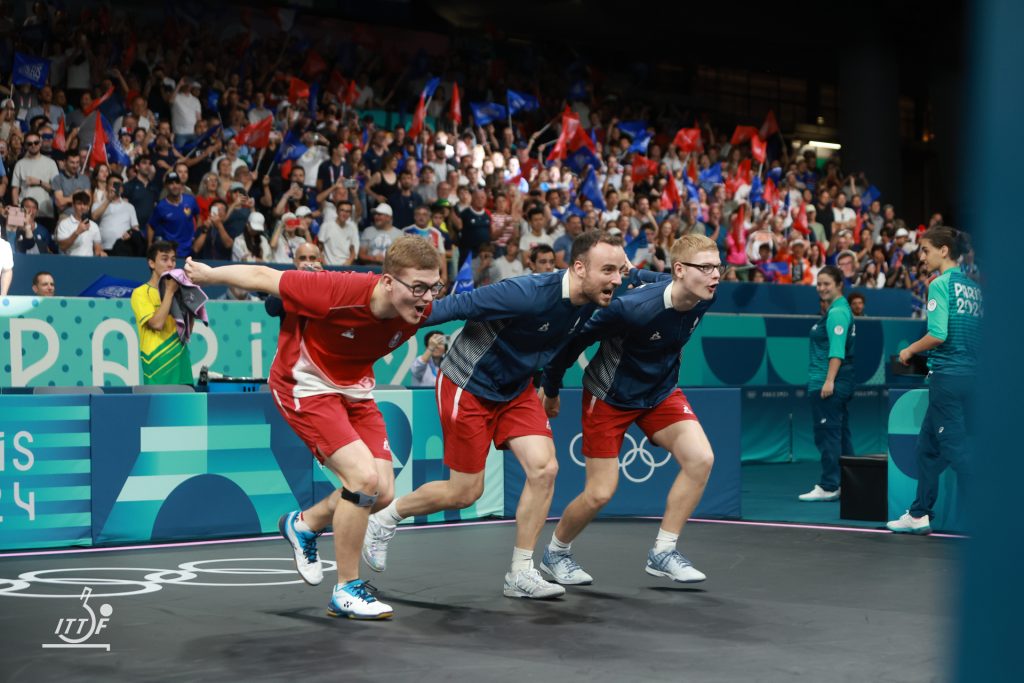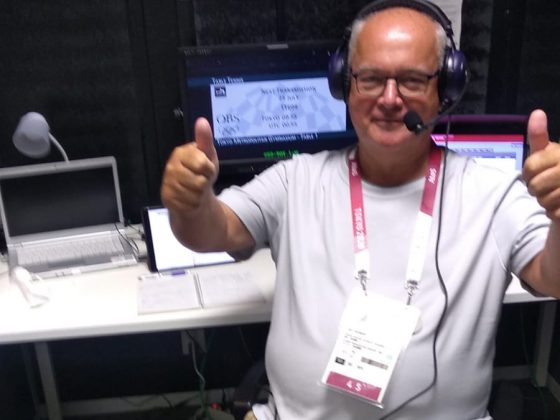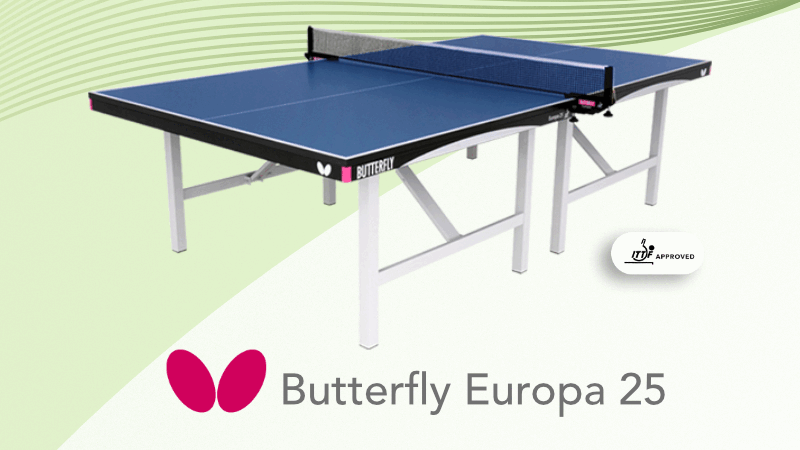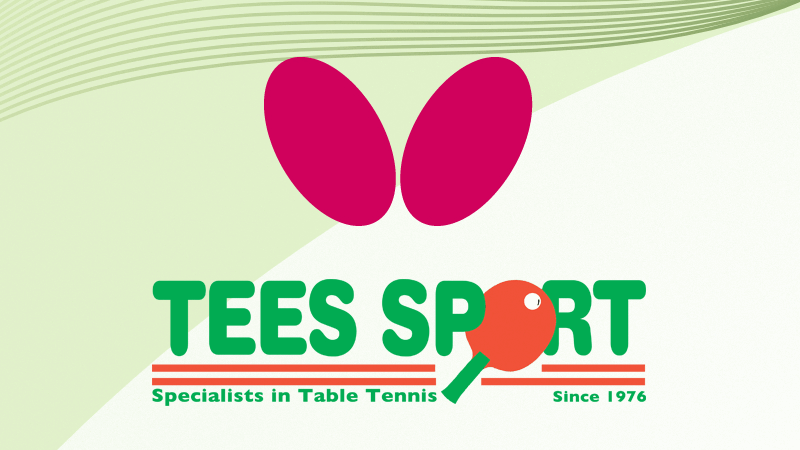The great Timo Boll retired after competing for Germany at his seventh Olympic Games in Paris. Five other athletes* have appeared at a magnificent seven Games.
But someone very well known to English table tennis fans is celebrating clocking up a perfect 10 Olympic appearances since the sport was first introduced at the 1988 Games in Seoul.
Our very own Don Parker (pictured above at the Tokyo Olympics) has graced the commentary box at every Games since then, from the South Korean to the French capital, via Barcelona, Atlanta, Sydney, Athens, Beijing, London, Rio and Tokyo.
And while it may not be the same as competing on the field of play, his full house of 10 Olympiads is a feat few – if any – can match.
It all started in Seoul, where Don was leading and coaching the GB team of Des Douglas, Alan Cooke, Carl Prean and Sky Andrew.
Once the athletes’ campaigns had finished, Don was asked by legendary BBC commentator Tony Gubba to add his expert analysis to the commentary.
“He was quite high-profile and asked me to come and help him as an expert, so I commentated with him, and then the same thing happened in Barcelona in 1992.
“My primary role at those Games was to help the athletes in my own small way, but then I used to step across and help the BBC out.
“I remember in Barcelona going to help him with the Men’s Singles final between Gatien and Waldner. I got to the venue and couldn’t believe the queues outside but then a car pulled up and a load of Swedes got out, all dressed up, and got to the front of the queue – so I followed them.
“I said to them after we got in ‘I hope you don’t mind, I followed you in, you must be important’ and this young man replied ‘actually, my father’s the king!’
“That was useful later because when Waldner won, he went to celebrate in the crowd and I worked out that it must be the king he was talking to – so I was able to say that on commentary, which impressed the BBC!”
Having extended his run working with the BBC through the next few Olympics, Don has worked at the last three Games for the Olympic Broadcasting Services (OBS), which provides live coverage for broadcasters around the world – who can opt to take the English commentary too if they wish.
Don said: “The first rule is that the commentary must be non-biased, because the commentary could go out anywhere they speak English.”
OBS has a small army an the Olympics, ranging from producers, sound engineers and electricians to lead commentators – the wordsmiths – and colour commentators who are usually experts in their sport.
There are about 120 commentators in the OBS team, across almost 40 sports. They include Guy McCrae – who also works on table tennis for WTT – and well-known former athletes such as Neil Adams (judo), Heather Fell (modern pentathlon) and Martin Cross (rowing).
Don shared the booth with 2004 Paralympic table tennis champion Mateja Pintar and was also alongside Adam Bobrow, the American ‘voice of WTT’.
“Adam’s an interesting character and we have quite different styles – he’s talking non-stop! But he doesn’t half know his table tennis,” said Don.
“There’s a quite a few who are not necessarily wordsmiths, a bit like me – I wouldn’t class myself as a commentator, my background is playing and coaching. But they are people who were far better athletes than me and they try to pair them up with people from the commentary world – though I can do either the lead or colour commentator role now if they want me to.”
One of the main changes Don has seen over the years is the ease of access to background information.
He said: “Adam’s quite obsessive about how to pronounce the players’ names, especially the Chinese, and that’s something I’ve always tried to be respectful of as well.
“There’s a site we use called My Info, which you register for, and you can find out about the players – and it includes an audio clip of them pronouncing their own names, which is the first time we’ve had that.
“I do a lot of research on the ITTF website too and that access to information now is really good and is improving all the time.”
What isn’t always apparent is that none of the table tennis commentary in Paris was actually done in the venue. Instead, Don worked out of the International Broadcast Centre (IBC) near Charles de Gaulle airport, on the other side of the French capital.
“The technology there is unbelievable, the number of screens – the people who do the production are very clever,” said Don.
“I have someone counting me in and telling me when to start and stop, but once the game has started, you don’t hear a thing from them and you just rattle on with the commentary.

“This year was the first time I’ve been exclusively at the IBC and never at the venue, but I could still tell Paris was the loudest atmosphere. When they were on their feet stamping in the stands, it sounded like a train going through.
“Beijing, when the Chinese were playing in front of the Chinese crowd, was a tremendous atmosphere, and so was Barcelona where a lot of Swedes and French came down to support their players.”
Sweden and France won men’s singles gold and silver in Barcelona, and this time it was silver and bronze for those nations.
Don added: “It was great to see two European men on the podium and for the second Games running, we had athletes from Europe, Asia, Africa and the Americas in the quarter-finals, so I think it’s good for table tennis that we’ve got players coming through from all corners of the world.
“I think the Chinese found it tougher this time – they still dominated in terms of winning gold medals, but I think the gap is narrowing and you could tell they were being pushed, particularly on the men’s side.”
* The five seven-time table tennis Olympians are: Olufunke Oshonaike (NGR), Jorgen Persson (SWE), Zoran Primorac (YUG/CRO), Jean-Michel Saive (BEL) and Segun Toriola (NGR)





